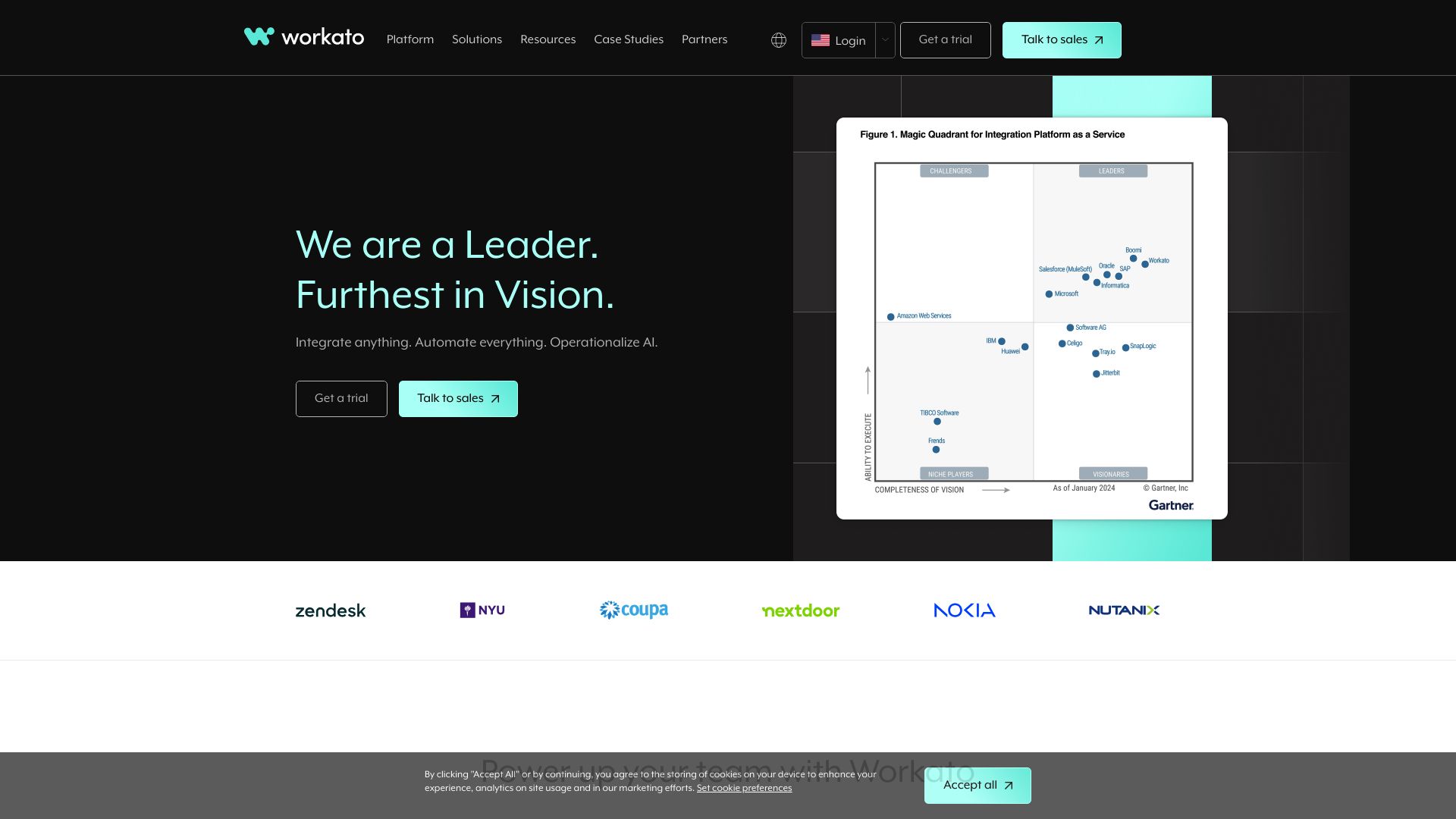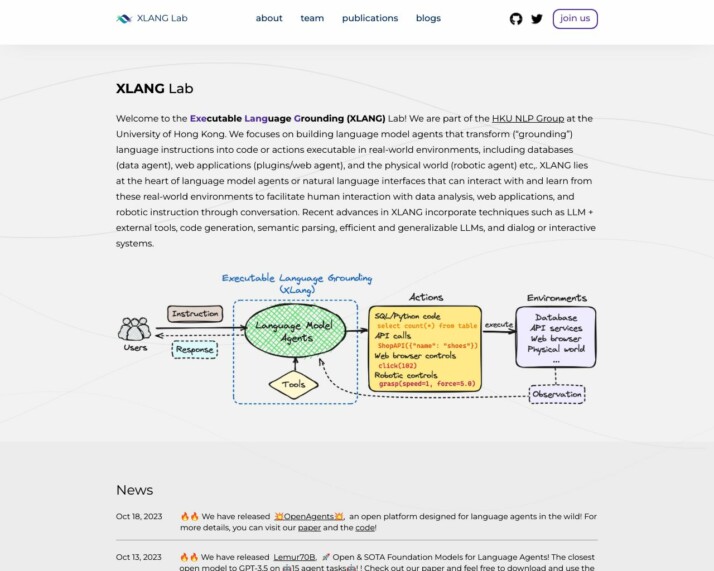Workato vs. OpenAgents: AI Automation Showdown
AI-powered automation platforms revolutionize business processes, offering unprecedented efficiency and innovation. This comparison explores Workato vs. OpenAgents, and SmythOS, three leading solutions in the AI automation space. Workato delivers enterprise-grade workflow automation with robust AI integration, while OpenAgents focuses on specialized AI agents for specific tasks.
SmythOS emerges as a versatile platform, combining comprehensive automation capabilities with user-friendly AI agent creation and deployment. We’ll examine each platform’s strengths, limitations, and unique features to help you determine the best fit for your organization’s needs, whether you’re a developer seeking advanced customization, a business leader prioritizing scalability, or a non-technical user looking for accessible AI solutions.
Workato Overview
Workato empowers businesses to automate complex workflows and integrate diverse applications without extensive coding. This enterprise-grade platform combines robust AI capabilities with a user-friendly interface, catering to both technical and non-technical users.


Workato’s AI by Workato, developed in collaboration with OpenAI, integrates advanced AI models into automation processes. This feature enables text analysis, categorization, email drafting, and translation without compromising data privacy. The platform’s low-code/no-code approach democratizes automation, allowing business users to create sophisticated workflows rapidly.
Workato’s AI by Workato…integrates advanced AI models into automation processes…enabling text analysis, categorization, email drafting, and translation without compromising data privacy.
The platform excels in comprehensive workflow automation, combining data storage, user interface customization, and business logic. Workato’s pre-built solutions, such as the Knowledge Workbot Accelerator and Actions by Large Language Model, streamline the integration of knowledge bases and action execution within enterprise applications.
Workato’s enterprise focus ensures scalability, security, and governance, making it suitable for large organizations with complex automation needs. The platform’s marketplace offers over 1,500 connectors and community recipes, fostering collaboration and reducing development time. However, the platform’s enterprise-level capabilities may result in higher costs, potentially limiting accessibility for smaller organizations or those with constrained budgets.
While Workato offers powerful AI integration and automation capabilities, users should consider the platform’s learning curve and potential complexity, especially for those new to automation tools. The platform’s rate limits on AI actions and lack of granular permission settings for AI features may also require careful management in high-volume or security-sensitive environments.
OpenAgents Overview
OpenAgents revolutionizes AI integration with its open-source platform for creating, hosting, and managing AI agents. The system centers around three specialized agents: Data Agent for complex data analysis, Plugins Agent with over 200 integrations for diverse tasks, and Web Agent for autonomous web browsing.


Data Agent excels in processing large datasets, generating insights crucial for roles like marketing. The Plugins Agent’s extensive library adapts to various user needs, from weather checks to online shopping. Web Agent, equipped with a Chrome extension, streamlines internet navigation by automating browsing tasks.
OpenAgents emphasizes user-friendliness with its web UI and backend server, making AI accessible to non-experts.
OpenAgents emphasizes user-friendliness with its web UI and backend server, making AI accessible to non-experts. The platform allows for localhost deployment and supports the integration of new agents and plugins, showcasing its adaptability. This approach bridges the gap between expert and novice users, providing practical AI solutions for real-world challenges.
While OpenAgents offers impressive capabilities, it faces competition in the rapidly evolving AI landscape. The platform’s reliance on open-source components may present challenges in terms of long-term support and enterprise-grade security features. Additionally, the learning curve for effectively utilizing all three agents could be steep for some users.
OpenAgents integrates seamlessly with various tools and systems, leveraging its plugin architecture and web-based interface. This flexibility allows for compatibility across different platforms, enhancing its utility in diverse computing environments. The platform’s position in the competitive landscape is strengthened by its focus on practical, task-oriented AI agents, though it may need to evolve rapidly to maintain its edge against proprietary solutions offering more polished user experiences.
Feature Comparison
Workato and OpenAgents offer distinct approaches to AI-powered automation, each with its own strengths and limitations. Workato excels in enterprise-grade workflow automation with robust AI integration, while OpenAgents provides a more specialized focus on task-specific AI agents.
Workato’s comprehensive platform includes AI by Workato, developed with OpenAI, enabling advanced text analysis, categorization, and translation within automated workflows. The platform’s low-code/no-code interface democratizes automation across organizations. However, Workato lacks some of the specialized AI agent capabilities found in OpenAgents, such as the Data Agent for complex data analysis and the Web Agent for autonomous browsing.
OpenAgents shines with its three specialized agents — Data, Plugins, and Web. The Data Agent’s prowess in handling large datasets and generating insights surpasses Workato’s general data processing capabilities. OpenAgents’ Plugins Agent, boasting over 200 integrations, rivals Workato’s extensive connector library. The Web Agent’s autonomous browsing capabilities through a Chrome extension offer unique functionality not present in Workato.
While both platforms support multi-agent systems, OpenAgents’ focus on practical, task-oriented AI agents provides a more streamlined approach for specific use cases. Workato’s strength lies in its comprehensive workflow automation, combining data storage, user interface customization, and business logic in a unified platform.
In terms of security and scalability, Workato’s enterprise focus ensures robust features suitable for large organizations. OpenAgents, being open-source, may require additional effort to match Workato’s enterprise-grade security and scalability. However, OpenAgents’ open nature allows for greater customization and community-driven development.
Workato’s pre-built solutions and accelerators offer a significant advantage for rapid deployment in enterprise settings. OpenAgents, while potentially more flexible, may require more setup time to achieve similar levels of integration and automation.
Both platforms strive for user-friendliness, but their approaches differ. Workato’s low-code/no-code platform caters to business users, while OpenAgents emphasizes accessibility for both expert and non-expert users through its web UI and specialized agents.
In conclusion, the choice between Workato and OpenAgents depends on specific needs. Workato suits enterprises seeking comprehensive workflow automation with AI capabilities, while OpenAgents appeals to users requiring specialized AI agents for data analysis, web automation, and plugin-based tasks.
Feature Comparison Table
| Workato | OpenAgents | SmythOS | |
|---|---|---|---|
| CORE FEATURES | |||
| Visual Builder | ✅ | ❌ | ✅ |
| No-Code Options | ✅ | ❌ | ✅ |
| Autonomous Agents | ❌ | ✅ | ✅ |
| Multimodal | ❌ | ✅ | ✅ |
| Multi-Agent Collaboration | ❌ | ✅ | ✅ |
| Agent Work Scheduler | ✅ | ❌ | ✅ |
| SECURITY | |||
| Constrained Alignment | ❌ | ❌ | ✅ |
| IP Control | ✅ | ❌ | ✅ |
| COMPONENTS | |||
| Huggingface AIs | ❌ | ✅ | ✅ |
| Zapier APIs | ❌ | ✅ | ✅ |
| Data Lakes | ❌ | ❌ | ✅ |
| DEPLOYMENT OPTIONS (EMBODIMENTS) | |||
| Staging Domains | ✅ | ❌ | ✅ |
| Production Domains | ✅ | ❌ | ✅ |
| Deploy as Scheduled Agent | ✅ | ❌ | ✅ |
| DATA LAKE SUPPORT | |||
| Hosted Vector Database | ❌ | ❌ | ✅ |
| Sitemap Crawler | ❌ | ❌ | ✅ |
| YouTube Transcript Crawler | ❌ | ❌ | ✅ |
| URL Crawler | ❌ | ✅ | ✅ |
Best Alternative to Workato and OpenAgents
SmythOS stands out as the superior alternative to Workato and OpenAgents, offering a comprehensive AI-driven automation platform that combines the best of both worlds. Our platform excels in ease of use, an extensive feature set, and unlimited use cases, making it the ideal choice for businesses seeking to harness the power of AI.
Unlike Workato’s limited AI capabilities and OpenAgents’ specialized focus, SmythOS provides a versatile ecosystem for creating and deploying AI agents. We offer a visual builder with drag-and-drop functionality, empowering users to design complex AI workflows without extensive coding knowledge. This feature surpasses both Workato’s low-code interface and OpenAgents’ more technical approach, democratizing AI development across organizations.
SmythOS provides a versatile ecosystem for creating and deploying AI agents… empowering users to design complex AI workflows without extensive coding knowledge.
SmythOS bridges the gap between Workato’s enterprise-focused automation and OpenAgents’ specialized AI agents. We support multi-agent collaboration, allowing teams of AI agents to work together on complex tasks. This capability goes beyond Workato’s workflow automation and OpenAgents’ individual agent approach, enabling more sophisticated and efficient problem-solving.
Our platform’s multimodal capabilities set us apart from both competitors. While OpenAgents offers some multimodal features, SmythOS takes it further by supporting various forms of input and output, including text, voice, images, and video. This versatility enables the creation of more advanced and interactive AI solutions that Workato simply cannot match.
SmythOS offers unparalleled flexibility in deployment options. We provide hosted agents for both development and production environments, staging and production domains, and the ability to deploy as APIs, webhooks, site chats, and scheduled agents. This comprehensive approach surpasses both Workato’s enterprise deployment focus and OpenAgents’ more limited options, ensuring that our platform can adapt to any business need or use case.
Conclusion
Workato and OpenAgents offer powerful AI-driven automation solutions, each with unique strengths. Workato excels in enterprise-grade workflow automation, integrating AI capabilities seamlessly into business processes. Its low-code approach and extensive connector library cater well to large organizations seeking comprehensive automation solutions. OpenAgents, on the other hand, shines with its specialized AI agents for data analysis, web automation, and plugin-based tasks, appealing to users needing focused AI assistance in specific areas.
However, SmythOS emerges as the superior choice, combining the best of both worlds and offering additional advantages. Our platform provides a versatile, user-friendly environment for creating and deploying AI agents across various platforms. With our intuitive drag-and-drop interface, users can build complex AI workflows without extensive coding knowledge, democratizing AI development.
SmythOS stands out with its extensive integration ecosystem, supporting over 300,000 integrations and a wide range of AI models from providers like OpenAI, Anthropic, and Hugging Face. This flexibility ensures that our platform can adapt to virtually any workflow or business process. Our multi-agent orchestration capability enables teams of AI agents to collaborate on complex tasks, enhancing efficiency and scalability.
We invite you to experience the future of AI automation with SmythOS. Create a free SmythOS account today and explore our platform’s capabilities with unlimited agents and a 30-day money-back guarantee. Discover our diverse range of AI-powered agent templates to jumpstart your automation journey, or dive into our comprehensive documentation for in-depth insights. With SmythOS, you’re not just adopting an AI platform; you’re revolutionizing your approach to business automation and innovation.
Last updated:
Disclaimer: The information presented in this article is for general informational purposes only and is provided as is. While we strive to keep the content up-to-date and accurate, we make no representations or warranties of any kind, express or implied, about the completeness, accuracy, reliability, suitability, or availability of the information contained in this article.
Any reliance you place on such information is strictly at your own risk. We reserve the right to make additions, deletions, or modifications to the contents of this article at any time without prior notice.
In no event will we be liable for any loss or damage including without limitation, indirect or consequential loss or damage, or any loss or damage whatsoever arising from loss of data, profits, or any other loss not specified herein arising out of, or in connection with, the use of this article.
Despite our best efforts, this article may contain oversights, errors, or omissions. If you notice any inaccuracies or have concerns about the content, please report them through our content feedback form. Your input helps us maintain the quality and reliability of our information.
